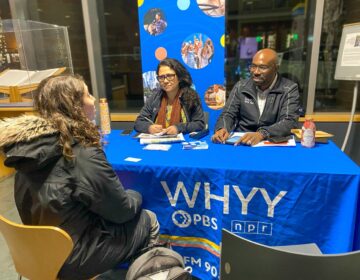Northwest civics preparing for new community zoning review, CHCA will testify at Tuesday hearing
Representatives of at least one Northwest civic group are planning to appear at a city Planning
Commission meeting Tuesday, for a discussion of the community zoning and design review processes set to begin with the new zoning code on Aug. 22.
The Planning Commission is currently accepting applications from civic and issue-based groups wanting designation as registered community organizations, or RCOs, making them part of a newly-required community engagement requirement for zoning variance approvals and large-scale developments.
The hearing is scheduled to begin at about 3 p.m. Tuesday after a regular Planning Commission meeting, in Room 18-029 at 1515 Arch St.
Chestnut Hill still wants a say in projects
Members of the Chestnut Hill Community Association (CHCA), which has been working on ways to make sure its long-established community zoning and development review processes will still work under the new code, will appear to read from a prepared statement.
While community engagement is usually regarded as a good thing, the RCO process initially raised concerns it will give civic groups more power at the expense of individuals, as Plan Philly has reported. In Chestnut Hill, the CHCA has been trying to maintain its own detailed process of zoning and design review with what will be required under the new code.
Lawrence McEwen, a co-chair of the CHCA’s Design Review Committee, confirmed the civic planned to attend the meeting and was working on the details of a statement asking the Planning Commission to reaffirm that the new zoning code doesn’t nullify their own process. The new code requires only a single public meeting between property owners or developers and the public, but the CHCA often requires several meetings with various committees before the group will give major plans approval.
“We are a national historic district in an environmentally sensitive area, so we do have different issues than other neighborhoods,” McEwen said, adding that while everyone’s goal is to have better-quality development city-wide, the CHCA wonders if one required meeting can accomplish that.
“If developers are unwilling to go through our process, we are much less likely to be supportive of projects when they go to the ZBA,” McEwen said. The CHCA had initially asked the planning commission to create a special primary designation for RCOs with established zoning review processes, which they declined. Now, the CHCA seeks only confirmation that the new code doesn’t preclude them from using their process, McEwen said.
“We’re basically, in the end, are trying to get them to confirm our understanding of the new code, that our process can continue forward as it is,” he said.
Who speaks for the neighborhood?
Meanwhile, other Northwest civics are also getting ready, and representatives of the Ridge Park and Upper Roxborough civics, along with the East Falls Community Council and the Ridge-Allegheney-Hunting Park (RAH) groups say they have also submitted applications to be designed RCOs in their respective areas.
In the case of East Falls, the process could force a compromise — or at least, put in place a plan for official cooperation — in a long-simmering border dispute over which civic should represent a part of the neighborhood once called “Paradise,” between Scotts Lane and Route 1.
Both the East Falls Community Council and RAH say the area falls within their historical boundaries, and enlisted the help of City Councilman Curtis Jones Jr.’s office to mediate the dispute. Rosalie Cooper, RAH’s president, said the groups have been told they will “share” that area, meaning both groups could be involved in reviewing variance and development proposals.
Under the new code, a single property could be represented by more than one RCO, and each could issue its own opinions on whether to support or oppose plans.
“We both would be informed [about projects] just with that particular area,” Cooper said. “Nothing is taken from [EFCC]. We’re just trying to get everything together. I’d rather for us to work together, I just want it to be fair to everyone involved.”
Meg Greenfield, who chairs the EFCC’s zoning committee, stopped short of saying there was an agreement in place, but said her group would abide by the RCO regulations when the new code goes into effect.
“The Planning Commission has imposed a requirement that we share responsibility in some yet-to-be-adequately defined manner,” Greenfield said. “If there’s a project up there, there would have to be a joint meeting.”
Eva Gladstein, deputy executive director of the planning commission, said they began receiving RCO applications before the June 1 opening of the application process, so a list of registered groups should be in place by the end of summer.
“We will be notifying groups in July, so that the plan is by August 22 there will be both a list and the registry will be available on the Planning Commission’s website,” she said.
Once compiled, the RCO information would be added to online zoning maps, a detail that sounds geeky and minor but could prove helpful. On the official zoning map, available here: http://citymaps.phila.gov/zoningoverlay/index.html , enter an address — for example, 8200 Germantown Ave., the Chestnut Hill site slated for Bowman Properties’ new mixed-use development.
Right now, you’ll see the base zoning district information for that parcel (R5, C2 and R10b), along with a list of the overlays that apply. Once the RCO information is gathered, some version of it, too, will pop up on that map, Gladstein said. So property owners and developers will have little question on how to involve the community in projects, or whom they should contact.
In areas without active civic groups or designated RCOs, the district councilman “shall act as the RCO,” which Gladstein said she interprets to mean they would have to hold a public meeting, not simply make a decision alone.
NewsWorks has partnered with independent news gatherer PlanPhilly to provide regular, in-depth, timely coverage of planning, zoning and development news. Contact Amy Z. Quinn at azquinn@planphilly.com.
WHYY is your source for fact-based, in-depth journalism and information. As a nonprofit organization, we rely on financial support from readers like you. Please give today.




